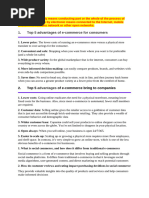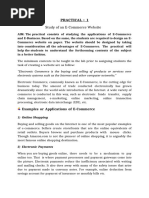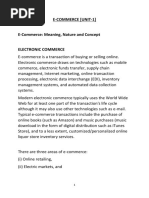0 ratings0% found this document useful (0 votes)
14 viewsBenefits of E-Commerce 12
Benefits of E-Commerce 12
Uploaded by
ajama7121Copyright:
© All Rights Reserved
Available Formats
Download as PPTX, PDF, TXT or read online from Scribd
Benefits of E-Commerce 12
Benefits of E-Commerce 12
Uploaded by
ajama71210 ratings0% found this document useful (0 votes)
14 views11 pagesOriginal Title
Benefits of E-commerce 12
Copyright
© © All Rights Reserved
Available Formats
PPTX, PDF, TXT or read online from Scribd
Share this document
Did you find this document useful?
Is this content inappropriate?
Copyright:
© All Rights Reserved
Available Formats
Download as PPTX, PDF, TXT or read online from Scribd
Download as pptx, pdf, or txt
0 ratings0% found this document useful (0 votes)
14 views11 pagesBenefits of E-Commerce 12
Benefits of E-Commerce 12
Uploaded by
ajama7121Copyright:
© All Rights Reserved
Available Formats
Download as PPTX, PDF, TXT or read online from Scribd
Download as pptx, pdf, or txt
You are on page 1of 11
Benefits Of E-commerce
1. Abdihakim jama abdikarim
2. Abdirahman abdirashid hassan
3. Abdirazack abdirahman yazin
4. Abdirazack jama ciid
5. Abdiwazac rage abdullahi
There are several advantages of e-commerce that have contributed to
its widespread adoption and success.
Here are some key advantages:
1) Low costs
A significant advantage of ecommerce is that launching an
online store is much less costly than opening a physical store.
You are not required to furnish your outlet, nor are you
required to pay rent or hire multiple workers. Marketing and
advertising campaigns are also inexpensive.
Additionally, the online portal is computerised and automated,
which saves significant money. One of the primary benefits of
ecommerce is the absence of a middleman, which results in a
substantial cost reduction.
2) Speed & Flexibility
A person or business can easily open an ecommerce store in a
matter of days. In contrast, a physical store requires space,
commercial leasing, and sufficient construction and decoration
time before opening. In an e-commerce platform, displays and
product ranges can be changed instantly, while in a physical
store, this requires careful preparation, adequate time and
manpower. In terms of versatility and speed, e-commerce sites
far outperform retail outlets, which is regarded as a key
feature of ecommerce.
Without renting office space, the seller is able to manage all
activities from the comfort of his home.
3) Faster Buying Process
Previously, a customer had to schedule his shopping trip in
advance, even though he desired to purchase a single item.
This will include rearranging his schedule and making the
purchase at the store. Another vital advantage of ecommerce is
that it expedites the purchasing process.
A trip to the outlet that is approximately two to three hours
away from your home is no longer required. Simply sit back in
the comfort of your own home or workplace, conduct a
product search, and complete the order.
Additionally, online stores are open 24 hours a day, seven days
a week, allowing you to shop at your leisure.
4) Product Catalogue
Customers are looking for a detailed overview of the items they wish to
purchase, which is a critical aspect of ecommerce. An e-commerce
platform provides its customers with a product catalogue that includes
data sheets that detail all of the company’s products and services.
The characteristics, utility, and specifications are comprehensive.
Even the colours of certain items, such as cell phones, are defined so
that you can make your selection based on personal preference.
Customers can learn about the ingredients in edible items and gather
additional knowledge that is not available in retail stores.
4) Product Catalogue
Customers are looking for a detailed overview of the items they wish to
purchase, which is a critical aspect of ecommerce. An e-commerce
platform provides its customers with a product catalogue that includes
data sheets that detail all of the company’s products and services.
The characteristics, utility, and specifications are comprehensive. Even
the colours of certain items, such as cell phones, are defined so that you
can make your selection based on personal preference. Customers can
learn about the ingredients in edible items and gather additional
knowledge that is not available in retail stores.
5) Wider Customer Base
A physical store is based in a specific location, and in most
instances, residents in the nearby area can only come to shop.
Another advantage of e-commerce stores is that they are not
geographically limited.
Geographical boundaries become irrelevant when conducting
business online via ecommerce stores. You can sell your goods
to online shoppers around the world. You are not restricted to
shoppers within walking distance of your physical venue.
Additionally, the internet exposes the retail store to previously
untapped niche markets. By using various online touchpoints,
you can reach consumers in various ways, including social
media and forums.
7) Customer Data Insights
Another benefit of online selling that you might not have
considered is the ease with which consumer data can be
collected, analysed, and acted upon. If you want to maintain a
laser-like emphasis on the customer experience, you must own
the consumer data. By monitoring consumer experiences,
online selling enables you to collect first-hand data.
Customer preferences are critical, and an ecommerce store can
monitor and evaluate how often a buyer purchases products or
views other items in his portal
8 )Targeted Marketing
When you sell online, you won’t have to pay to reach
everybody, which is very costly. Your marketing budget
would be based on reaching out to the specific customers
who are most likely to be interested in what you’re selling
and purchase your products. You can choose who sees your
ads on online advertisement platforms based on keywords,
demographic details, geographic location, and even interests
and hobbies. Compared to a conventional brick and mortar
shop, this provides a much better ROI (Return on Investment)
to businesses.
9) Scalability
When a physical store experiences a spike of customers, it
becomes extremely difficult to manage them due to
insufficient staff. Scaling up or expanding a physical store
needs additional floor space and resources, each with a cost.
In comparison, growing an online store is extremely easy,
which is one of the less apparent advantages of e-commerce
for businesses.
All that is required is additional inventory, some digital
tweaks, and probably additional storage space, which is
significantly less expensive than storefront space.
Additionally, being online removes the need to open a new
store in a different location since you are already connected to
a global marketplace.
10) Reviews & Ratings
Customers are encouraged to leave feedback on online stores in order to
learn about customer satisfaction and any issues they are having when using
the products and services. The availability of these reviews on ecommerce
stores allows potential buyers to learn more about the product and
determine if it is appropriate for their specific needs. It also aids sellers in
improving their services and products to increase sales and customer
satisfaction.
We cannot find ratings or reviews of a product in a physical store, so we
had to rely on our friends who had used the items to get useful information.
In contrast, a customer can read reviews in the comfort of his own home
and decide based on his preferences without asking his friends or family
when shopping online.
You might also like
- Catholic Reformation and Renewal ArticleDocument34 pagesCatholic Reformation and Renewal ArticleShadow BoomNo ratings yet
- First Quarter Diagnostic Test - English 10Document2 pagesFirst Quarter Diagnostic Test - English 10Abraham GaviolaNo ratings yet
- Online ShoppingDocument22 pagesOnline ShoppingkirthanaNo ratings yet
- Mekelle University Research On PharmacyDocument16 pagesMekelle University Research On Pharmacysolomon demissew100% (2)
- Vegan Kitchen by Foodie Takes Flight PDFDocument173 pagesVegan Kitchen by Foodie Takes Flight PDFLarissa Veres100% (1)
- Water CycleDocument3 pagesWater CycleAryan SinghNo ratings yet
- E-Comm Unit - 5Document13 pagesE-Comm Unit - 5VarshaNo ratings yet
- E-Commerce: (Also Read:)Document23 pagesE-Commerce: (Also Read:)L LNo ratings yet
- Commercial Law AssignmentDocument5 pagesCommercial Law Assignmentkamaramariama547No ratings yet
- What Is EDocument2 pagesWhat Is EtheNo ratings yet
- Wa0119Document46 pagesWa0119JosNo ratings yet
- Unit-1 Introduction To E-Commerce 1Document45 pagesUnit-1 Introduction To E-Commerce 1Aakash RegmiNo ratings yet
- Chapter 1 IntroductionDocument6 pagesChapter 1 IntroductiondevanshilavanivaNo ratings yet
- BCO184Document28 pagesBCO184youtune2005No ratings yet
- EcommerceDocument9 pagesEcommercemarioNo ratings yet
- Chapter 1-On Line ShopDocument11 pagesChapter 1-On Line ShopMary Josette Baco EbajoNo ratings yet
- Entrep BehaviourDocument6 pagesEntrep BehaviourMiral CatubingNo ratings yet
- E-Com Module 2Document15 pagesE-Com Module 2ritikagraphicdesigner5No ratings yet
- Assignment 6 Saavedra Mark AnthonyDocument3 pagesAssignment 6 Saavedra Mark AnthonyMark SaavedraNo ratings yet
- Unit 1: Introduction To E-CommerceDocument50 pagesUnit 1: Introduction To E-CommerceVlog PlanetNo ratings yet
- Article by James MorrishDocument6 pagesArticle by James Morrisharmstrong amoahNo ratings yet
- Advantages of E-CommereceDocument6 pagesAdvantages of E-CommereceAman SharmaNo ratings yet
- E-Commerce Important QuestionsDocument24 pagesE-Commerce Important QuestionsSwathi SwaNo ratings yet
- Handbook-E CommerceDocument59 pagesHandbook-E CommerceShivansh SinghNo ratings yet
- Executive Summary: Product MissionDocument32 pagesExecutive Summary: Product MissionFaquirSanoarSanyNo ratings yet
- Internet Enabled RetailingDocument36 pagesInternet Enabled RetailingvijaybhaskarreddymeeNo ratings yet
- E Commerce FileDocument34 pagesE Commerce FileKamal HodaNo ratings yet
- DicussionDocument2 pagesDicussionnvy79848No ratings yet
- E CommerceDocument4 pagesE Commercemanishagupta93108No ratings yet
- WPD Microproject 2022-23Document20 pagesWPD Microproject 2022-23Sahendra Vishwakarm0% (1)
- 6505 19815 1 PBDocument6 pages6505 19815 1 PBAgung TerminantoNo ratings yet
- AbstractDocument10 pagesAbstractAmbuj JoshiNo ratings yet
- L6 Trends In E-CommerceDocument56 pagesL6 Trends In E-Commercedhpm6nh4xmNo ratings yet
- E - Commerce NotesDocument47 pagesE - Commerce NotesR KNo ratings yet
- Development of Savemore SupermarketDocument11 pagesDevelopment of Savemore SupermarketFrencis Faye TorioNo ratings yet
- Speech Draft AthirahDocument4 pagesSpeech Draft AthirahAishah FarihaNo ratings yet
- Ecom U4Document12 pagesEcom U4Lakshmi PoojaNo ratings yet
- Class 1 Activity 2 - Trends of E Business 2023-2024Document3 pagesClass 1 Activity 2 - Trends of E Business 2023-2024Cristine Silva AguilarNo ratings yet
- Business Requirements SpecificationDocument9 pagesBusiness Requirements SpecificationSriram SrirangamNo ratings yet
- Unit 5Document7 pagesUnit 5JosNo ratings yet
- E Com NotesDocument29 pagesE Com Noteskainatvalani25No ratings yet
- What Is The Best Way To Create An Ecommerce Website?Document15 pagesWhat Is The Best Way To Create An Ecommerce Website?Kushal BajracharyaNo ratings yet
- LhihihuuuuuuuuuuuuuuujhhhhhhhhhhhhhhhhhhhhhhhhhhhhDocument3 pagesLhihihuuuuuuuuuuuuuuujhhhhhhhhhhhhhhhhhhhhhhhhhhhhm72029967No ratings yet
- E Commerce FileDocument16 pagesE Commerce Filebharat sachdevaNo ratings yet
- APK5Document2 pagesAPK5armstrong amoahNo ratings yet
- Electronic Commerce, Commonly Known As E-Commerce or Ecommerce, IsDocument22 pagesElectronic Commerce, Commonly Known As E-Commerce or Ecommerce, IsAbhijit NandiNo ratings yet
- Grocery StoreDocument16 pagesGrocery StoreBhavya0% (1)
- E-Commerce lab file908Document32 pagesE-Commerce lab file908vikrantmishra070No ratings yet
- wwDocument2 pageswwGargi TomarNo ratings yet
- Set ADocument5 pagesSet AAli KhalilNo ratings yet
- E-Commerce (Unit-1)Document98 pagesE-Commerce (Unit-1)Anurag KandariNo ratings yet
- E-Commerce Vs Physical StoresDocument6 pagesE-Commerce Vs Physical Storeswegafo1365No ratings yet
- BSS057-6 Corporate Innovation and Entrepreneurship Assignment 1 - Critical Evaluation of Selected VignettesDocument11 pagesBSS057-6 Corporate Innovation and Entrepreneurship Assignment 1 - Critical Evaluation of Selected VignettesShubham AgarwalNo ratings yet
- SE - Practical 2 - SRS (ONLINE - SHOPPING)Document9 pagesSE - Practical 2 - SRS (ONLINE - SHOPPING)Dev PatelNo ratings yet
- What Are The Advantages of Ecommerce?: Ecommerce Advantage #1: Low Financial CostDocument18 pagesWhat Are The Advantages of Ecommerce?: Ecommerce Advantage #1: Low Financial Costkerya ibrahimNo ratings yet
- Business PlanDocument35 pagesBusiness Plankhairul1286No ratings yet
- Business Requirements SpecificationDocument6 pagesBusiness Requirements SpecificationSHASHIKANTNo ratings yet
- 282200H Nov 19Document6 pages282200H Nov 19nikaken88No ratings yet
- Quizz 1 E CommerceDocument7 pagesQuizz 1 E CommerceZunab AzharNo ratings yet
- Unit Ii 1Document9 pagesUnit Ii 1Nallamilli Naga SreyaNo ratings yet
- E-Com Module 1Document20 pagesE-Com Module 1ritikagraphicdesigner5No ratings yet
- Advantages and Disadvantages of Online ShoppingDocument3 pagesAdvantages and Disadvantages of Online ShoppingShu Fang Teo100% (2)
- How to Build an Online Store - eCommerce Project Management: Beginners GuideFrom EverandHow to Build an Online Store - eCommerce Project Management: Beginners GuideNo ratings yet
- On Rounds - 1000 Internal Medicine Pearls - 9781496322210 - Medicine & Health Science Books @Document5 pagesOn Rounds - 1000 Internal Medicine Pearls - 9781496322210 - Medicine & Health Science Books @wong0% (1)
- Chapter ThermalCracksinConcreteStructure BasicIssuestobeUnderstoodDocument13 pagesChapter ThermalCracksinConcreteStructure BasicIssuestobeUnderstoodmirvahid HOSSiNi100% (1)
- Cornell Notes 6RsDocument1 pageCornell Notes 6RsAzalia Delgado VeraNo ratings yet
- 100 Objective Question and Answer of Plant PathologyDocument23 pages100 Objective Question and Answer of Plant PathologyAnitharaj Alaguvel100% (3)
- Cómo Escribir Un Ensayo de MemoriasDocument6 pagesCómo Escribir Un Ensayo de Memoriasafmojjjyr100% (1)
- Math 120. Colledge Algebra & Trigonometry. Course Outline. ApprovedDocument11 pagesMath 120. Colledge Algebra & Trigonometry. Course Outline. ApprovedTú Nguyễn100% (1)
- Rubric For Talk ShowDocument1 pageRubric For Talk ShowRN Anunciacion100% (2)
- Thoracic Surgery ManualDocument63 pagesThoracic Surgery ManualAhmed Abd El HamedNo ratings yet
- At The MarketDocument12 pagesAt The MarketAbrorjon DehqonovNo ratings yet
- GitHub - peggy1502_Amazing-Resources_ List of references and online resources related to data science, machine learning and deep learning_Document41 pagesGitHub - peggy1502_Amazing-Resources_ List of references and online resources related to data science, machine learning and deep learning_Ashish SinhaNo ratings yet
- Diagnostic Lights - Dell OptiPlex 755 User Manual (Page 347)Document5 pagesDiagnostic Lights - Dell OptiPlex 755 User Manual (Page 347)juan carlos100% (1)
- Stereoscopic Inpainting: Joint Color and Depth Completion From Stereo ImagesDocument8 pagesStereoscopic Inpainting: Joint Color and Depth Completion From Stereo Imagesgdreddy25No ratings yet
- Faculty of Management and Commerce - South Eastern University of Sri LankaDocument28 pagesFaculty of Management and Commerce - South Eastern University of Sri LankaruzaikanfNo ratings yet
- CarbohydratesDocument47 pagesCarbohydratesjosephgalaniNo ratings yet
- IP 12 - Set - 1 DS2Document16 pagesIP 12 - Set - 1 DS2Vaibhav NegiNo ratings yet
- Business-Communication Solved MCQs (Set-4)Document8 pagesBusiness-Communication Solved MCQs (Set-4)Leo Bogosi MotlogelwNo ratings yet
- Dravidians Is The Founder of IndiaDocument1 pageDravidians Is The Founder of IndiaThayashiney NaiduNo ratings yet
- Plummer Vinson Flashcards (IncompleteDocument2 pagesPlummer Vinson Flashcards (IncompleteIan FordeNo ratings yet
- GRAPHSDocument10 pagesGRAPHSAdrian OradaNo ratings yet
- Grades 6 Daily Lesson Log: December 4, 2023 Monday Mathematics 6Document11 pagesGrades 6 Daily Lesson Log: December 4, 2023 Monday Mathematics 6cherry salesNo ratings yet
- ReferenceDocument2 pagesReferencenersesboghosNo ratings yet
- Examine The Structure of The EMP - DEPT - VU ViewDocument8 pagesExamine The Structure of The EMP - DEPT - VU ViewSaptarshi_DasguptaNo ratings yet
- Plastic Surgery: American Society of Plastic SurgeonsDocument3 pagesPlastic Surgery: American Society of Plastic SurgeonsSidali Kouroughli100% (1)
- Layout & Load DiagDocument9 pagesLayout & Load Diaghpss77100% (1)
- Day 2 - Networking PresentationDocument37 pagesDay 2 - Networking PresentationKartikNo ratings yet
- Frenny Kong EssentialDocument18 pagesFrenny Kong EssentialShekinah PuntilarNo ratings yet

























































































